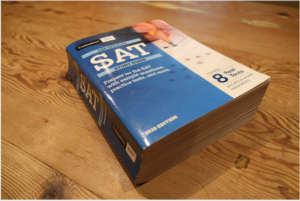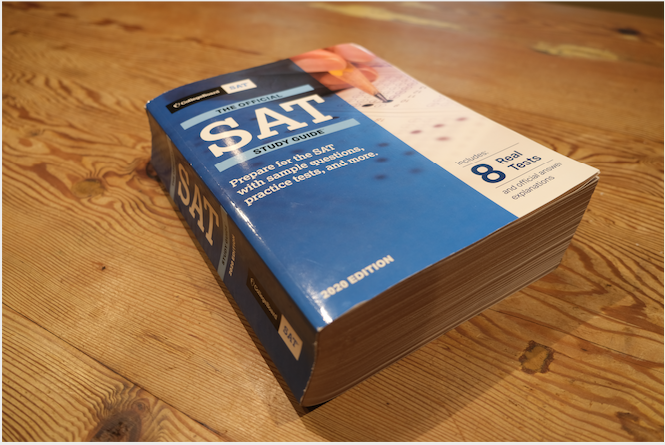Substantial changes in the way colleges use standardized testing in the college application process, especially in California.
The Scholastic Aptitude Test (SAT) is a widely required standardized test component of the college application process in the United States. The SAT has been used by colleges for the past 95 years and tests students on math, reading and writing skills. Some students take the American College Testing (ACT) — a similar standardized test — as part of their college application process rather than the SAT.
The main difference between the SAT and ACT is the ACT has a science section where students have to use science-reasoning and reading comprehension skills, but the SAT does not have a science section. Additionally the ACT is a faster paced test with 5 minutes less overall compared to the SAT, and there is less time per question.
As of 2020, the SAT has become the more popular test option according to the college board. In 2020, approximately 1.7 million students took the ACT whereas over 2.2 million students took the SAT.

photo by Ethan Rendon
Colleges that were test-optional long before the pandemic included more selective schools like the University of Chicago, Wesleyan and Middlebury. Colleges that shifted to test-optional pre-pandemic did so because of their awareness surrounding the discriminatory nature of standardized tests.
Test-agnostic schools have also gained momentum. Test-agnostic means whether or not a student decides to submit test-scores, colleges will not look at them when evaluating a student’s application.
It has become more apparent that standardized testing is not equitable. Wealthy students may have access to tutoring, private school education and other advantages, whereas poor students lack these resources. The SAT was also redesigned in 2016 to closer align itself with the Common Core curriculum taught in public schools. This aimed to take out biased assumed-knowledge aspects of the test.
According to Krista Klein, the co-director of college counseling at Lick-Wilmerding, the increase in test-optional and test-agnostic schools benefits everyone. “It is a win-win for students because it gives everyone choice about how they want to present themselves, and I think it’s a win-win for the colleges too, because last year it helped them bring in the most diverse and interesting classes they have ever had,” said Klein.
Last year, most of the LWHS class of 2021 did not take or submit test scores. 85 students, more than 65% of the class, did not submit test scores to colleges at all. Of the 33% who did submit test scores, many students didn’t submit them to every school they applied to.
This year, seniors are not quite finished with the process, but Klein estimates 48 students— 35% of the class—did not test at all. A total of 70 students, about 50% of the class, will not be submitting their scores.
Ana Huesby ’22 has been navigating the changing standardized testing policies while applying to colleges this year. Huesby said, “I think it’s good that it’s not required because I feel like there’s so much privilege that goes along with doing well on standardized tests. Also, standardized tests aren’t really about your ability to do certain school work, it’s more about doing well on tests.”
Huesby’s sister, who graduated in 2020, had less choice when it came to submitting test scores to schools. Huesby said, “It definitely changed the schools my sister applied to, even though she got good grades, she just didn’t test very well.”
High school context plays a large role in applying to college and deciding whether or not submitting test scores will be beneficial. Klein emphasizes LWHS students’ reputation and the leg-up that gives in college admissions. Klein said, “Colleges know the rigorous curriculum and after the transcript, profile, two teacher recs and one college counselor rec, a test score wasn’t the thing that would be moving the needle toward or away from admission.”
If a student comes from a school where there is more variation between students, Klein thinks attaching a strong test score to your application would likely be helpful.
A student’s academic profile is made up of so many different pieces and testing is just one part. According to Klein, colleges look at your transcript, the school you come from, the classes you take, two teacher recommendations as well as one counselor recommendation.
Klein said, to prepare for tests “most students end up paying a lot of money, and spending a lot of time on this activity that isn’t making you a better human being, isn’t making you healthier, isn’t making you more interesting.” At the moment, Klein advises students to take time spent studying for the SAT and use it to explore new opportunities and hobbies. That is what really counts and will make a student a more interesting applicant.
Due to the pandemic, schools have reevaluated their requirement of test scores. During quarantine, it was difficult for students to find a testing location. Most testing sites were closed and testing dates were frequently cancelled.
Since the pandemic, test-optional colleges have become much more common, decreasing the amount of students who take and submit test results. According to the College Board, 1.5 million high school students in the class of 2021 took the SAT whereas in 2020, 2.2 million students took the test.
According to the University of California (UC) system, for both in-state residents and international students, UC schools will not consider exam scores during their admission process. Students can choose to submit test scores, which may be looked at for course placement if enrolled. International students have to show English proficiency, but no test scores are required. The UC’s are guaranteed to remain test-agnostic through 2023 and most likely 2024.
Columbia University and Cornell University were the first Ivy League schools to declare their continuation of the test-optional protocol into the 2021–2022 school year. All other Ivy Leagues followed, and now do not require applicants to submit any test scores, however, students may if they wish.
Last year, in the LWHS class of 2021, two-thirds of the students admitted to Cornell and Stanford University did not submit test scores.
A school that is classified as a test-optional/results are not required but considered is Georgetown. They are one of the few colleges that openly communicated with the LWHS college counseling department a preference for the test score component despite technically being a test-optional school this year. Klein doubts Georgetown will remain test-optional in years to come as they have always been a test-score focused school.
Most every other school besides state schools in Florida and Georgia are test-optional at this point.
The future of standardized testing for colleges is still up in the air, but more flexibility and choice should be expected. Since the pandemic, schools (and even some before), have been trending more and more towards test-optional and test-agnostic policies which will most likely continue to grow in popularity.
school work, it’s more about doing well on tests.”
Huesby’s sister, who graduated in 2020, had less choice when it came to submitting test scores to schools. Huesby said, “It definitely changed the schools my sister applied to. Even though she got good grades, she just didn’t test very well.”
High school context plays a large role in applying to college and deciding whether or not submitting test scores will be beneficial. Klein emphasizes LWHS students’ reputation and the leg-up that gives in college admissions. Klein said, “Colleges know the rigorous curriculum and after the transcript, profile, two teacher recs and one college counselor rec, a test score wasn’t the thing that would be moving the needle toward or away from admission.”
If a student comes from a school where there is more variation between students, Klein thinks attaching a strong test score to your application would likely be helpful.
A student’s academic profile is made up of so many different pieces and testing is just one part. According to Klein, colleges look at your transcript, the school you come from, the classes you take and two teacher recommendations, as well as one counselor recommendation.
Klein said, to prepare for tests “most students end up paying a lot of money, and spending a lot of time on this activity that isn’t making you a better human being, isn’t making you healthier, isn’t making you more interesting.” At the moment, Klein advises students to take time spent studying for the SAT and use it to explore new opportunities and hobbies. That is what really counts and will make a student a more interesting applicant.
Due to the pandemic, schools have reevaluated their requirement of test scores. During quarantine, it was difficult for students to find a testing location. Most testing sites were closed and testing dates were frequently cancelled.
Since the pandemic, test-optional colleges have become much more common, decreasing the amount of students who take and submit test results. According to the College Board, 1.5 million high school students in the class of 2021 took the SAT whereas in 2020, 2.2 million students took the test.
According to the University of California (UC) system, for both in-state residents and international students, UC schools will not consider exam scores during their admission process. Students can choose to submit test scores, which may be looked at for course placement if enrolled. International students have to show English proficiency, but no test scores are required. The UC’s are guaranteed to remain test-agnostic through 2023 and most likely 2024.
Columbia University and Cornell University were the first Ivy League schools to declare their continuation of the test-optional protocol into the 2021–2022 school year. All other Ivy Leagues followed, and now do not require applicants to submit any test scores, however, students may if they wish.
Last year, in the LWHS class of 2021, two-thirds of the students admitted to Cornell and Stanford University did not submit test scores.
A school that is classified as a test-optional, or results are not required but considered, is Georgetown. They are one of the few colleges that openly communicated with the LWHS college counseling department a preference for the test score component despite technically being a test-optional school this year. Klein doubts Georgetown will remain test-optional in years to come as they have always been a test-score focused school.
Most every other school besides state schools in Florida and Georgia are test-optional at this point.
The future of standardized testing for colleges is still up in the air, but more flexibility and choice should be expected. Since the pandemic, schools (and even some before), have been trending more and more towards test-optional and test-agnostic policies which will most likely continue to grow in popularity.






